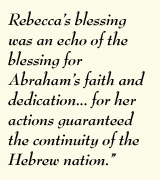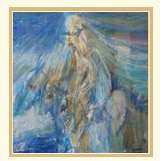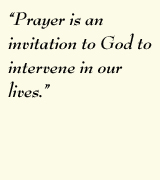Rebecca’s Vision
Introduction
Following Sarah’s death, it was Rebecca who secured the destiny of the family and hence of the nation. Rebecca, the second matriarch receives the fullest treatment of the four founding mothers of Israel. She is the only woman whose birth is actually recorded. In fact her birth notice is mentioned immediately after the Akedah. The sequence of events is noteworthy. Isaac is spared from the sacrificial knife, God’s promise to Abraham is reiterated, and Rebecca’s birth is mentioned (Gen. 22:23). The spotlight is shone upon her as a child of destiny and an agent of this promise.
Sarah and Rebecca are paralleled in rabbinic literature for being exemplary in their involvement in Jewish family life. The similarities of their actions are highlighted in the following midrashic passage:
And Isaac brought her (Rebecca) to the tent of his mother Sarah. As long as his mother Sarah was alive there was a cloud which was suspended over the entrance of her tent. When she died the cloud disappeared. When Rebecca arrived the tent reappeared. As long as Sarah was alive her doors (openings) were (wide) graciously opened for visitors when she died the graciousness ceased. When Rebecca arrived the graciousness returned. As long as Sarah was alive there was blessing in the dough, when Sarah died the blessing ceased. When Rebecca arrived the blessing returned. As long as Sarah was alive the candle burned from Friday evening to Friday evening. When she died the candle blew out. When Rebecca arrived the candle burned again. When Isaac saw that she made challah in purity he immediately brought her into his tent.
Genesis Rabbah 9:16
This midrash accentuates the active roles the matriarchs played in creating an aura of holiness; a notion symbolized by the cloud hanging over their tents. The blessing in the dough and the Shabbat candles, represent the mitzvoth given to women to assure the sanctity of domestic life both in terms of physical and spiritual sustenance. (link to Hannah: challah niddah vehadlakat haner Rav Soleveitchik) . Rebecca is described as continuing the Jewish traditions established by the first founding mother Sarah. The hospitality extended to others through the wide opened tent points to Rebecca’s exemplary behavior as being a direct extension of the home of Abraham.
Scripture itself draws a most striking parallel between Rebecca and Abraham. She like Abraham undertook the decisive journey from Mesopotamia to Canaan that marked Israel’s destiny. She was the one who responded to the Divine call–leaving her land, her birthplace, and her father’s home to follow her vocation. Seder Eliyahu Rabbah (25:7) highlights Rebecca’s giant step. In this text all four matriarchs are credited with bringing about the Exodus from Egypt. Three of them – Sarah, Rachel and Leah – made the same concession. They each allowed their husbands to take additional wives in order to bear them sons, thereby literally building the nation of Israel. Such was not the case with Rebecca. While living in Mesopotamia, she was visited by Abraham’s servant, who came to take her to Canaan to be Isaac’s wife. Resistance to her immediate departure was posed by her father and brother. In a daring step, the servant suggested that Rebecca herself be consulted: “Let us call the girl and ask for her reply. They called Rebecca and said to her, Will you go with this man? And she said, I shall go.” (Gen 24:57-58). In the merit of her unequivocal response “I shall go,” – an expression of her total trust in God – she was chosen to be among the favored few who built the Jewish nation.
How appropriate, therefore, that in response to her consent “I shall go,” the following blessing is bestowed upon her: “O sister, may you grow into thousands of myriads. May your offspring seize the gates of their enemies.” Don Isaac Abarbanel points out that “It appears as if these are the words of the Living God, as if He placed them in their mouths (Laban and Bethuel) since these are the very words spoken to Abraham at the Akedah, ‘And your descendants shall seize the gates of their foes’ (Gen. 22:17). Rebecca’s blessing was an echo of the blessing for Abraham’s faith and dedication at the Akedah, for her actions guaranteed the continuity of the Hebrew nation.
This notion was incorporated into a techinah (Yiddish prayer) recited when the shofar is blasted:
And I implore you mother Rebecca to pray for our father and mother so that we should not, heaven forbid, be separated from them. For you know well how much one can miss their father and mother since Eliezer, Abraham’s servant took you far far away from your mother and father to bring you to your husband Isaac. You no doubt spilled tears like water. Therefore you know how sad it is to be without a father and without a mother. So you be our father and mother….
Tikva Frimer Kensky extends the parallel lines between Abraham and Rebecca noting that they both are models of hospitality (Gen 18:1-8/24:1-9: 10-14:) Moreover, it is through Rebecca’s initiative that Isaac duplicates Abraham’s charge that his son should not marry a local woman and repeats the promise God gave him assuring that Jacob’s future will imitate Isaac’s. Rebecca secured Jacob’s blessing and command to marry from the line of Terach. (22) She played the pivotal role in that chapter of salvation history. Hence, she represents the direct link between Abraham and Jacob. Rebecca plays an even more extensive role than Sarah in deciding the future of her children. She determines the success of her son against her husband’s inclinations and acts as God’s partner working to bring about His will. Frimer-Kensky contrasts the pro-activism of the first two matriarchs with the second two and concludes that Rebecca’s vital intervention is accentuated when contrasted with the following generation:
Rachel’s premature death on the other hand has great consequences for Jacob’s family. She is not there to guide her young son Joseph as the children grow up or mediate between brothers. Leah does not fill this position in the family. Either she is too busy managing a household with thirteen children, or she also dies at some point. Without Rachel’s presence, Jacob cannot ensure their transition to the next generation. As the stories of Genesis show, nobody orchestrates their marital contracts, and stresses between Jacob and his grown sons and among the brothers threaten to destroy the family. When nobody rocks the cradle nobody rules the world.[1]“The Hand that Rocks the Cradle: The Rivka Stories, Tikva Frymer Kensky, p.23
Rebecca’s Prayer
Like Abraham, Rebecca’s life was riddled with trials. She began with the ordeal of lech lecha. Thereafter, she contended with twenty years of barrenness, internal struggle and anguish during pregnancy, choosing between sons, losing one, then losing both. Notably, when the twins struggled within her, it was she and not Isaac who “went to inquire of the Lord” (Gen 25:22), and was granted revelation regarding the nations that were to spring from her womb. Sustained by that proclamation of her destiny, Rebecca remained steadfast throughout all her tribulations. She displayed spiritual fortitude in awaiting the unfolding of the covenant.
But let us return to the beginning of her story to discover Rebecca’s contribution to the world of prayer.
After her marriage, she and Isaac sustained twenty years of barrenness. Nahum Sarna notes:
Once again, we encounter the motif of the barren wife of the patriarch. In the present instance, Rebecca’s inability to procreate is tinged with irony, for she has gone to her marriage with her family’s blessing echoing in her ears: “O sister ! May you grow into thousands of myriads.” Now twenty years have passed and the divine pledges that Isaac would be the progenitor of a people remain unredeemed
The Bible describes Isaac’s pleas for a child.
Isaac pleaded with the Lord on behalf of his wife, because she was barren and the Lord respondedto his plea, and his wife Rebecca conceived. But the children struggled in her womb, and she said, “If so, why do I exist?” She went to inquire of the Lord and the Lord answered her.
(Gen 25:21-22)
Isaac’s pleading is expressed through the phrase: vayeetar Yitzhak lnochach ishto, classically translated: Isaac pleaded with the Lord on behalf of his wife, because she was barren . Genesis Rabbah uses this expression to describe how Isaac and Rebecca prayed together:
We learn that Isaac prostrated himself in one corner and Rebecca in another (praying) and Isaac said, “Master of the Universe may all of the sons that you give me be from this righteous woman and (Rebecca) prayed may all of the sons that you give me be from this righteous man!”
(Genesis Rabbah 63:5)
The underlying premise of this midrashic text is that Isaac like his father and his son could have taken a second wife to produce offspring. However, he did not go that route. He chose partnering with Rebecca and using the power of prayer to overcome his predicament. Nahum Sarna continues:
The prolonged state of barrenness is profoundly meaningful in that it is ended by a deliberate act of divine Providence, a clear sign that the resulting offspring are predestined to be the instruments of God’s purposes.”
(Sarna p 179)
What is unusual about this midrash is that Rebecca makes the same declaration as Isaac, “may all of the sons I bear be from this righteous man.” It was not as if her world allowed for her to take another man! The literary underpinnings of this text are freighted with meaning. Rebecca is again portrayed as taking destiny by the hand. Just as she demonstrated determination in her lech lecha scene, wagering that life would validate her decision against all odds, so too she plays the role of the leading lady taking Isaac as her leading man to continue the line of Abraham.[2]As later Tamar of Tamar and Yehuda does wanting a son with the righteous man. Furthermore, Rebecca relies on the power of prayer. This midrashic overlay includes Rebecca as actively engaging in prayer. She not only prays for a child but rather for a child from Isaac. The midrash extrapolates from the character of Rebecca who resolutely began her courageous journey to Canaan toward family and future, as well as information explicitly supplied in the biblical text that follows:
And the Lord responded to his plea, and his wife Rebecca conceived. But the children struggled in her womb, and she said, “If so, why do I exist?” She went to inquire of the Lord.
(Gen. 25:21-22)
Where was it that she went? Several exegetical suggestions have been offered. Nahmanides asserts:” And she went to inquire of the Lord. I have never found the expression to inquire (drisha) in any context other than prayer.”[3]The first is that she went to the yeshiva of Shem and Ever reputedly the sages of the time. It was there that she thought to consult with religious authorities. Alternatively, she went to check with Abraham as to what the nature of her unusual pain was. (others say she didn’t want to cause him grief). Nahum Sarna points out:
She went to inquire of the Lord. The idiom employed means to seek divine guidance in a moment of great perplexity and anguish.(cf. Hannah) Generally one would go to a specific sanctuary or to some charismatic personage of recognized authority. In this case the narrative is tantalizingly short on details. According to verse 11 the couple is living at Beer-lahai-roi at this time, the place where Hagar had received the divine announcement concerning the birth and destiny of a son, as told in 16:7-14 This may have influenced Rebecca to go to the same site. It is to be noted that the divine name is carefully employed in both inquiry and response, as though to dissociate her action from any pagan cultic rite.
In his commentary Zror Hamor, Rabbi Abraham Sabba sharpens the focus:
‘And she went to inquire of the Lord. To pray in order to complete her deficiency’. The implication is that prayer offers the supplicant an in-depth glimpse into her soul and provides her with the ability to reassess her situation and impact upon her spiritual self, perhaps allowing for change to occur within as well as without. Prayer provides us with the ability to seek deeply within ourselves. It is there that we ‘inquire of the Lord’ to find out the answers to the most painful soul-searching questions.
Zeror HaMor Genesis 25:22
In the words of Abraham Joshua Heschel:
Prayer is an invitation to God to intervene in our lives, to let His will prevail in our affairs; it is the opening of a window to Him in our will, an effort to make Him the Lord of our soul.
References
| ↑1 | “The Hand that Rocks the Cradle: The Rivka Stories, Tikva Frymer Kensky, p.23 |
|---|---|
| ↑2 | As later Tamar of Tamar and Yehuda does wanting a son with the righteous man. |
| ↑3 | The first is that she went to the yeshiva of Shem and Ever reputedly the sages of the time. It was there that she thought to consult with religious authorities. Alternatively, she went to check with Abraham as to what the nature of her unusual pain was. (others say she didn’t want to cause him grief). Nahum Sarna points out:
She went to inquire of the Lord. The idiom employed means to seek divine guidance in a moment of great perplexity and anguish.(cf. Hannah) Generally one would go to a specific sanctuary or to some charismatic personage of recognized authority. In this case the narrative is tantalizingly short on details. According to verse 11 the couple is living at Beer-lahai-roi at this time, the place where Hagar had received the divine announcement concerning the birth and destiny of a son, as told in 16:7-14 This may have influenced Rebecca to go to the same site. It is to be noted that the divine name is carefully employed in both inquiry and response, as though to dissociate her action from any pagan cultic rite. |


